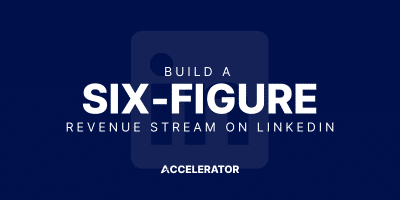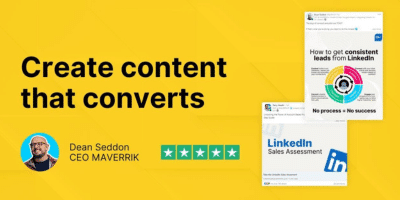When it comes to making sales, you are missing out if you are not using social media channels to your advantage. These channels allow you to easily connect and communicate with your audience, grow your network and make sales.
You don’t do this by spamming connections and randomly hitting people up with sales pitches. Instead, you can use them to create meaningful relationships where you can get to know and understand your prospects.
After all, this is what sales is all about.
You need to build relationships so you can find out what services would be beneficial to your prospects. This helps you target your content. Showing them why they need your service, starting a conversation that could lead to a sale.
However, there are a few different social media channels that you can choose from in order to connect with your prospects. Each one has its advantages and drawbacks, with some working better than others. So which are the best ones?
Obviously, from a B2B sales point of view, LinkedIn is the best platform. It is the ideal site to use for social selling as you can connect with prospects and post content with ease.
However, like every social media site, it is designed to waste your time. You can spend hours scrolling through other people’s content and getting lost in the posts. Put the time into your own posts and not get lost in the conversation.
If you’re finding it hard to build connections, improve your success rate or find you are posting content sporadically, then you need to work on improving your strategy. This article will help in acing your strategy.
Twitter is again one of those places that will zap a tonne of your time. However, it is relatively easy to build relationships, start conversations and take that conversation off Twitter to convert it into a sale.
The thing to be aware of on Twitter is the reach that your post or comment can have. It is easy for something you say to come back to haunt you and harm your prospecting.
However, if you’re careful to keep your content professional but personable then Twitter can work for you. It’s really good for connecting with people in professional services, CEOs in the tech sector and more.
If you are looking for small business owners then Facebook is a great tool for B2B prospecting. You can easily find marketing managers, business leaders and more who actively use the site.
You may think Facebook is more tailored towards B2C business, but you can find a lot of your prospects on the site. Usually, people are actively talking about their industries and services, making them easy to find.
Plus, you don’t have to hit people up or hound them in the comments to build a relationship. Instead, being active, liking and commenting where relevant, and engaging with their content is enough to pique their interest when you decide to message.
While Instagram is also a valid option for B2B, there are some sectors that it doesn’t seem to perform well for. On the other hand, if you’re looking for prospects in technology, finance, marketing or similar then Instagram will be beneficial.
Instagram is a highly visual platform so you will need to be producing engaging content that is relevant to your audience to really make use of the platform and grow your network. However, this can also be said for most other platforms too.
YouTube
When it comes to sites such as YouTube, this is where things get difficult. YouTube isn’t really designed for two-way conversations, so it doesn’t lend itself to B2B networking. However, if you want to commit to a long term plan, YouTube can help.
It can provide your prospects with more information and you can use the content uploaded on YouTube across other channels. While you may not be starting conversations directly here, it can certainly assist your strategy.
Tik Tok, Pinterest & Snapchat
These social media channels are very similar to YouTube in the terms of being more of a broadcast medium than a conversational medium. While they are great platforms for uploading and sharing content, most conversations will be started elsewhere.
Usually, platforms such as these can be used more effectively by marketing and promotional teams. Sales teams are able to leverage them but they will have to put in more work than with other sites.
What You Post Also Matters
It doesn’t matter what platform you use if you’re not posting the right thing. Every channel needs content and if you’re not posting it’s going to harm your conversations and ultimately your sales.
Your content is very important as a validator of you. It provides proof to your prospects that you know what you are doing and can provide value for them. If you’ve never realised this then you have missed a trick.
Lucky for you, the principles of social selling that I teach work on any platform, even email. All you have to do is adjust the strategy to leverage the quirks of each platform and that’s easier than you think. Why not get in touch so I can explain it further.






